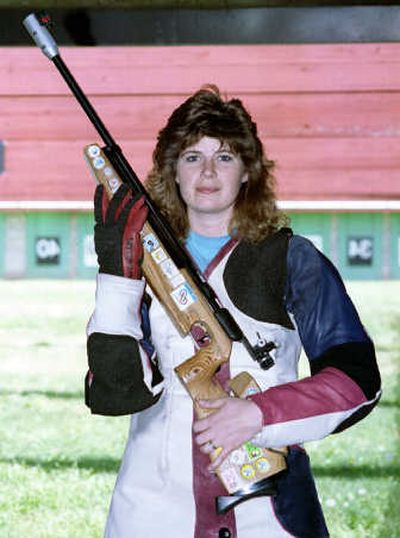Then & Now: Launi Meili gives her best shot

Her gold medal rifle is in a museum and she hasn’t fired a competitive round in 16 years – which doesn’t mean that Launi Meili doesn’t still get Olympic goose bumps.
But at football games?
“When I hear the national anthem, it really does bring a tear to my eye,” she said. “That was the culminating moment of what was such a monumental part of my life. Not that you have to relive it all the time, but sometimes it takes me back.”
Back to Barcelona in 1992, when 18 years of putting holes in targets no bigger than a dime were rewarded with an Olympic gold medal in women’s three-position smallbore. She was the first American to win that event and the first Olympian from Spokane County – she grew up in Cheney – to make it to the podium’s top step, beating John Stockton by nine days.
Not surprisingly, she’s devoted most of her time since to helping someone else up there.
Recently, that’s taken her to the U.S. Air Force Academy as its civilian rifle coach – leaving behind a program at Nebraska she built into an NCAA title contender and starting almost from scratch at a school where it might be assumed a sport with military roots would be a national power.
“This is a varsity team, but it was all walk-ons – the previous coach did not recruit,” she said. “There has been a huge attrition problem. There was one senior last year in a class that started out with six shooters. Like other sports, it takes years in shooting to get good – you have to have a special drive and motivation. The whole attitude has to shift here.”
And not just among the shooters.
“We have to do a lot of updating of equipment,” Meili said. “I mean, I have ammunition here from the ‘80s.”
Presumably the 1980s.
At Nebraska, Meili steered the Cornhuskers to three top-five NCAA finishes, including second in 2006 – a significant achievement for an all-female team, given that men make up nearly 75 percent of the sport’s available recruiting pool. Air Force, currently ranked 14th among the NCAA’s 34 rifle programs, shoots in the NCAA qualifying match this weekend in Lincoln, with the top eight teams advancing to nationals next month.
Meili and her family, husband Kevin Geddes and 3-year-old son Bryce, made the move for both practical and emotional reasons.
“I trained in Colorado Springs for seven years,” said Meili, a 10-year national team member who had residency at the U.S. Olympic Training Center there. “I still have a lot of good friends here and it felt like the right thing – and financially it was better than what I had going at Nebraska, though it was hard to leave my athletes there.”
The proximity of the USOTC facility also has implications for Meili’s program.
The center hosts many matches during the year that draw teenage shooters, including the Junior Olympics and the regional junior ROTC championships. In addition, the air-rifle trials for the 2008 Olympic team are scheduled there in March, and Meili will enter a couple of her shooters for the sake of experience.
“It’s nice to be able to just walk out my door and see some of the best kids in the country,” she said. “And the biggest pool for us will always be the junior ROTC group. Those are kids that are open-minded to the military and those coaches have been very well trained.”
They’ll still have to meet the academy’s rigorous standards – beginning with a Congressional nomination. Meili noted that this year’s freshman class had an average grade-point average of 3.86.
“But when they get here, they’re tough,” she said.
Any other lessons in that area can be passed along by the coach herself.
Meili made her first Olympic team in 1988 at age 25, and in Seoul led the air rifle competition going into the final 10-shot round – but wilted in that crucible and finished sixth. The failure was devastating, but it didn’t define her – and when she was in the same position in Barcelona in the three-position event, the experience likely paved her way to gold.
“There’s still just a sense of relief that all that hard work paid off,” she said. “You put your life on hold for so long and you’re so focused on accomplishing that huge goal that it’s sometimes overwhelming. I know exactly what those athletes are going through and I think I have something to offer them.”